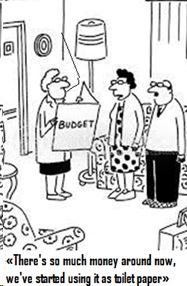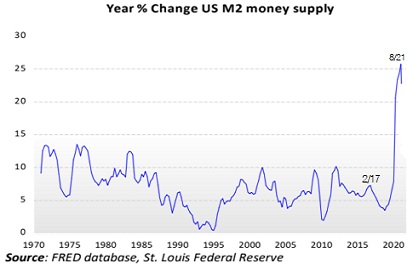The US Bureau of Labor Statistics (BLS) reported on December 10 that the Consumer Price Index (CPI), which intends to reflect inflation, rose 6.8% in the 11 months through November at a level that is only lower than the one reached 42 years ago during the economic crisis by the end of the Carter Administration. This compares negatively with the previous 4 years, when the CPI grew 10.5%, representing a 2.62% yearly inflation according to the CPI. 
However, the CPI is a misleading measure. When it was created reflected the gradual deteriorating reality of the purchasing power of US individuals and families, but its parameters have been distorted in recent decades through multiple revisions intended to hide the erosion of the dollar's real value and purchasing power This is happening due to the uncontrolled growth of the Money Supply caused by the Treasury Department's current policy without any support whatsoever from a proportional growth of the country's Gross National Product (GNP) nor counting on the proper adjustment of its balance of payments. Money supply (M2) in the U.S. has skyrocketed over the last two decades, up from $4.6 trillion in 2000 to $19.5 trillion in 2021. In fact, this humongous monetary policy represents a hidden tax of considerable proportions.
Government Economists use a basket of goods when calculating CPI. This basket contains a specific number and type of products that those economists believe most individuals will purchase to maintain a basic standard of living. But the CPI doesn't measure changes in consumer prices proportional to their rank in the family budget, therefore, it is not an accurate way to measure purchasing power. For example, the price of gasoline only represents a very low weight of 4% in the Index. In addition, it does not factor in changes in the quality of goods purchased nor it takes into consideration new items added to the basket of goods.
- Hits: 4031
 Los científicos sospecharon originalmente que se trataba de un hongo o de alguna otra variedad de microorganismo. No obstante, el ecologista Ignacio Gestoso notó en 2020 cómo la costra azul que estaba invadiendo las rocas costeras estaba compuesta de polietileno (PE), que es uno de los plásticos más empleados hoy día. Este investigador del Centro del Mar y Medio Ambiente (MARE, por sus siglas en inglés) afirma que la costra azul que está gradualmente cubriendo las rocas costeras, a la cual ha bautizado con el nombre de “plasticrust” (o plasticorteza), se origina por el batir de las olas contra las rocas que incrustan en ellas el plástico disperso en el mar que se ha disgregado en partículas diminutas y a veces microscópicas. Esto sucede porque el plástico no se disuelve ni se degrada en un proceso que puede tomar cientos de años.
Los científicos sospecharon originalmente que se trataba de un hongo o de alguna otra variedad de microorganismo. No obstante, el ecologista Ignacio Gestoso notó en 2020 cómo la costra azul que estaba invadiendo las rocas costeras estaba compuesta de polietileno (PE), que es uno de los plásticos más empleados hoy día. Este investigador del Centro del Mar y Medio Ambiente (MARE, por sus siglas en inglés) afirma que la costra azul que está gradualmente cubriendo las rocas costeras, a la cual ha bautizado con el nombre de “plasticrust” (o plasticorteza), se origina por el batir de las olas contra las rocas que incrustan en ellas el plástico disperso en el mar que se ha disgregado en partículas diminutas y a veces microscópicas. Esto sucede porque el plástico no se disuelve ni se degrada en un proceso que puede tomar cientos de años. En lo que va de año, la Reserva Federal (la Fed) se enfrascó en compras agresivas de activos (la llamada flexibilización cuantitativa), que ha impulsado la oferta monetaria estadounidense (un proceso descrito por algunos economistas como "producir dinero de la nada"). Este proceso de creación de dinero, a su vez, ha tocado los nervios de los economistas que vivieron el período de estanflación de la segunda mitad de la década de 1970 con una alta inflación en medio de una fuerte depresión económica.
En lo que va de año, la Reserva Federal (la Fed) se enfrascó en compras agresivas de activos (la llamada flexibilización cuantitativa), que ha impulsado la oferta monetaria estadounidense (un proceso descrito por algunos economistas como "producir dinero de la nada"). Este proceso de creación de dinero, a su vez, ha tocado los nervios de los economistas que vivieron el período de estanflación de la segunda mitad de la década de 1970 con una alta inflación en medio de una fuerte depresión económica.